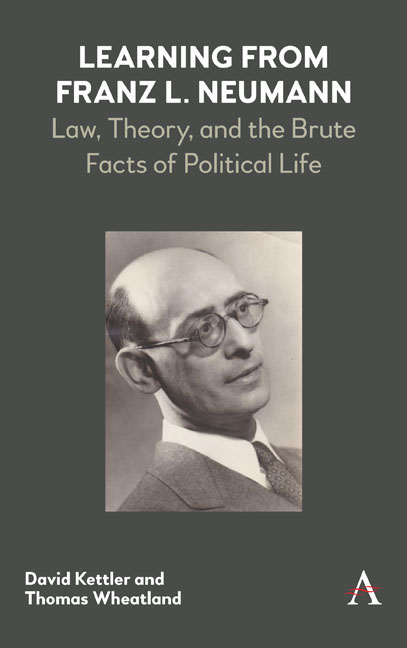Book contents
- Frontmatter
- Contents
- Chapter 1 The Challenge of Franz L. Neumann
- Chapter 2 Social Constitution, Social Power and Responsibility: Neumann and Labor Advocacy
- Chapter 3 Power, Resistance and Constitutions
- Chapter 4 Franz Neumann's Commemoration of Exile
- Chapter 5 After Weimar: The First Exile
- Chapter 6 Neumann's Second Exile: Negotiating the Politics of Research
- Chapter 7 No Happy End: Unprofitable Negotiations
- Chapter 8 Behemoth: Wars Can Be Lost
- Chapter 9 Franz Neumann in Washington: The Political Intellectual at War
- Chapter 10 Franz Neumann in the University: La guerre est finie
- Chapter 11 The Legacy: Four Studies
- Conclusion
- Index
Chapter 5 - After Weimar: The First Exile
Published online by Cambridge University Press: 06 September 2019
- Frontmatter
- Contents
- Chapter 1 The Challenge of Franz L. Neumann
- Chapter 2 Social Constitution, Social Power and Responsibility: Neumann and Labor Advocacy
- Chapter 3 Power, Resistance and Constitutions
- Chapter 4 Franz Neumann's Commemoration of Exile
- Chapter 5 After Weimar: The First Exile
- Chapter 6 Neumann's Second Exile: Negotiating the Politics of Research
- Chapter 7 No Happy End: Unprofitable Negotiations
- Chapter 8 Behemoth: Wars Can Be Lost
- Chapter 9 Franz Neumann in Washington: The Political Intellectual at War
- Chapter 10 Franz Neumann in the University: La guerre est finie
- Chapter 11 The Legacy: Four Studies
- Conclusion
- Index
Summary
Overview of Neumann's Writings in England, 1933– 36
If Franz Neumann's writings until the moment of exile almost all comprised legal advocacy in design as well as purpose, given the address of his commentaries as well to intellectuals, his most important exile writings were either more directly political or academic in manner. Although his decision to attend the London School of Economics (LSE) is clearly congruent with such a change in emphasis, nothing is known about the process by which Neumann came to enroll in a doctoral program focused on political theory rather than seeking to requalify himself for legal practice, as was done by his close associates, Otto Kahn- Freund and Ernst Fraenkel. It seems likely, however, that Harold J. Laski, who was to supervise Neumann's dissertation was an important factor. In the early days of Neumann's arrival in London, Laski was the sponsor and doubtless also the authority addressed in two quite different writings on the end of Weimar (and beyond).
Like Laski himself, Neumann also published some openly political writings in the exile Socialist press during his four years in England, taking a strong position on several of the issues most contested within the Socialist political emigration, which entailed, in turn, a controversial stand on the Socialist and trade- union politics of the Weimar years. His politics in those writings were “Left”— and thus critical of the majority in the Social Democratic exile organization— very much in the manner of the Neue Beginnen group, which had broken away from the party, although there is no evidence available of direct contacts with the group as such, which became somewhat influential among English émigré and labor groups only after his departure. Although tempting at times, and made more plausible by the positions taken by some of the non- Communist delegates to the mid- 1930s sequence of meetings in Paris, it would not be on balance accurate to identify his position with an opening to the Popular Front, which was an important political issue on the continent at the time. Neumann's focus remains on the trade unions and not on the political parties. After 1936, there is never again a piece of political advocacy of this frankly partisan type. And all we have by way of explanation is his remark in the exile lecture that he became convinced that there would be no revolution from within Germany.
- Type
- Chapter
- Information
- Learning from Franz L. NeumannLaw, Theory, and the Brute Facts of Political Life, pp. 95 - 202Publisher: Anthem PressPrint publication year: 2019



